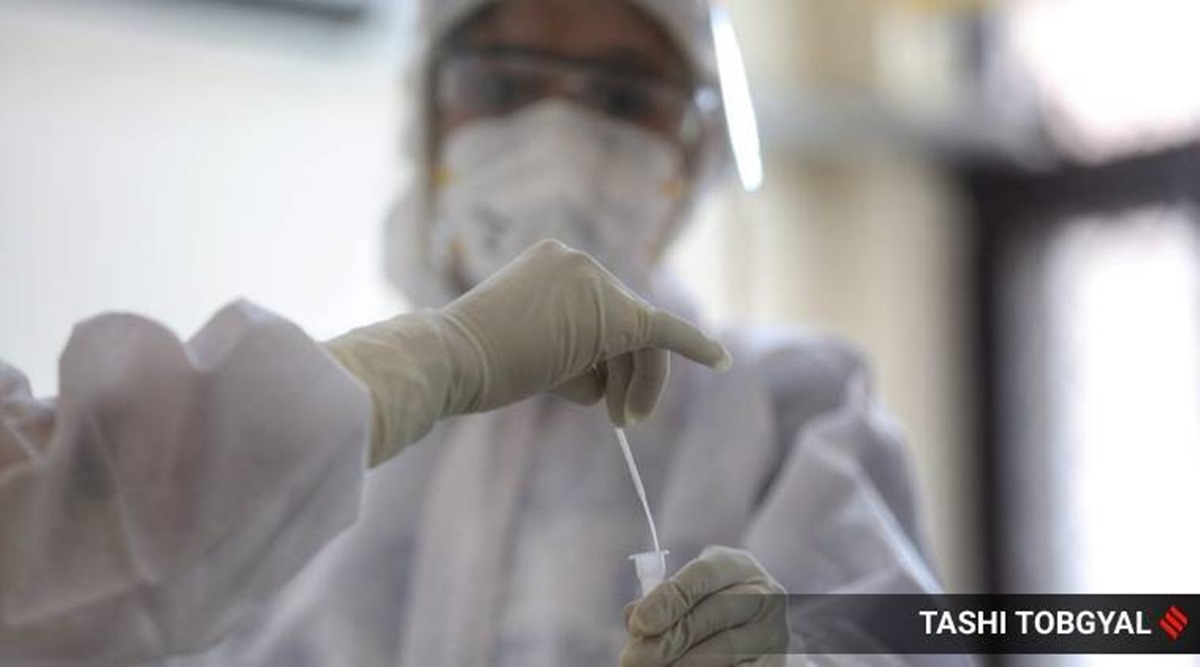 The researcher is, however, cautious to point out that there are data quality issues with the number of cases and deaths given out by the state. (Representational)
The researcher is, however, cautious to point out that there are data quality issues with the number of cases and deaths given out by the state. (Representational)Unlike its stand couple of months ago against increased testing for Covid-19, the Gujarat health department is now encouraging people to come out and undergo rapid antigen tests (RAT), through information, education and communication (IEC) targeted posters over social media.
Earlier, the department had submitted before the Gujarat High Court (HC) that increased testing would lead to fear psychosis among people, with more inadvertently testing positive.
The IEC posters are encouraging citizens to go for a test with the very first symptoms, highlighting that testing is the “first step for self-protection”. In the past eight days, 72,000-78,000 samples were tested each day in Gujarat, 10 per cent of which was via RTPCR and the remaining RAT. The test positivity rate for each day was around 1.6-1.8 per cent.
In mid-July, the state government opposed a plea by the Ahmedabad Medical Association (AMA) seeking increased testing, accusing it of harbouring “direct vested interests” and alleged that if testing was ramped up, it “would directly benefit the members of the applicant association”.
The government had also called the AMA’s stance “very much ironical”, on the premise that in the past, its members “were not agreeing to reduce/fix the ceiling rates for Covid-19 treatment” and that it was only “on account of indulgence of this court that the rates were fixed by the Ahmedabad Municipal Corporation…”
Back then, Gujarat was testing around 13,000-14,000 samples a day, around 60 per cent being RTPCR.
Health commissioner Jaiprakash Shivhare, however, attributes the earlier inhibition towards testing to resource crunch. “Earlier we had only RTPCR tests available, which we were utilising at full capacity. However, once antigen test was made available, we have increased testing by 10 times…”
In May also, the state health department opposed permitting testing for whoever wished to avail it, arguing about “the likelihood of fear psychosis cannot be ruled out if Covid testing is allowed in all asymptomatic cases, just for a feeling of safety and security.”
The state argued that if testing was allowed for all, “70% of the population” would test Covid-19 positive. The Gujarat HC had taken objection to the argument, saying the state was “gatekeeping” testing.
However, test positivity rate stands at less than two per cent at present.
A public health researcher who formerly dealt with preventive and social medicine and has been an advisor to urban local governments in dealing with Covid-19, points out that antigen tests have a sensitivity of 50 to 60 per cent.
“There was Raksha Bandhan, then Janmashtami in early August and we saw a spike in cases by the third week. Increased testing with more resources address mortality, which is the key concern and measure to assess intensity of the infection,” said the public health expert on condition of anonymity.
The researcher is, however, cautious to point out that there are data quality issues with the number of cases and deaths given out by the state.
“This is only counterproductive. Increasing cases is not tantamount to government failure in a disease like Covid-19,” said the expert.
While RTPCR tests have been termed as the gold standard for Covid-19 testing, in Rajkot, a top health department official said that symptomatic patients who were testing negative in antigen tests were not tested via RTPCR, despite the ICMR guidelines prescribing the same.